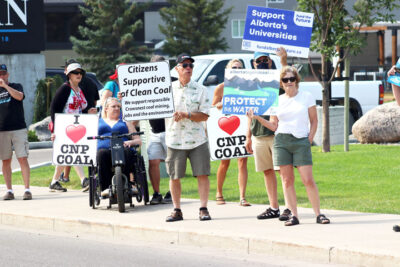Kenney addresses local Chamber
By Lethbridge Herald on July 28, 2021.
 Herald photo by Al Beeber
Protesters supporting, and opposed to Alberta Premier Jason Kenney, await his arrival at the Sandman Signature Lethbridge Lodge Wednesday morning. Dozens of supporters and opponents were lined up outside the hotel.
Herald photo by Al Beeber
Protesters supporting, and opposed to Alberta Premier Jason Kenney, await his arrival at the Sandman Signature Lethbridge Lodge Wednesday morning. Dozens of supporters and opponents were lined up outside the hotel.Tim Kalinowski
Lethbridge Herald
tkalinowski@lethbridgeherald.com
Premier Jason Kenney spoke to members of the Lethbridge business community and other representatives of the community at a luncheon hosted by the Lethbridge and District Chamber of Commerce on Wednesday.
In a 30-minute speech at the Sandman Signature Hotel to assembled guests an upbeat Kenney spoke about his excitement for the opportunities coming to Alberta now that the worst of the pandemic has passed.
Alberta’s economy is starting to look up, said Kenney, and new investment opportunities were on the horizon.
“I am hearing a lot of optimism,” he said.
“I just met people who started businesses during the crisis last year. Others having a hard time finding workers. Lethbridge and region have been one of the stronger parts of Alberta’s economy in recent years.
“I think with a lot of new investment in agriculture and agri-food businesses, you are going to see a lot of that growth continue. I am just happy to see people positive and upbeat about the future. I think with good reason.”
Kenney was particularly happy to see that optimism after one of the most difficult years Alberta has ever had since the Great Depression.
He said it spoke to the “culture of enterprise” and “resilience” all Albertans share.
“We weren’t just hit with a once- in-a-century health crisis, and a once-in-a-century collapse of the global economy, but, on top of that, the largest ever decline in energy prices in history,” he stated. “For an economy who 20 per cent of GDP is connected to the energy sector. That meant a triple whammy, and meant effectively last year we were coping with two recessions at once. And all of that on top of four or five tough years.
“I think what we have demonstrated as Albertans, what you have demonstrated as business and civic leaders, is that tremendous culture of resilience.”
Kenney said with oil prices rebounding, record venture capital investment in Alberta in 2020-2021, and an economy expected to grow by at least 4.8 per cent this year, he believed Alberta was finally turning the corner.
“Every region of the province has lost something,” he acknowledged. “It has gone through stress and anxiety, and loss of life, and great pressure on our healthcare system. We reached 26 per cent unemployment in the second quarter of last year. And yet, when I look back at how we have recovered, and how we are moving forward, it fills me with pride to be an Albertan.”
Kenney said with COVID-19 moving from pandemic stage to endemic stage thanks to high levels of vaccination in the province his government will be returning its attention to its original mandate when elected.
“We hear from everybody,” stated Kenney to reporters after his speech in reference to a question about dozens of protesters of various stripes that greeted him outside the Sandman on Wednesday, “but, at the end of the day, we were elected on a mandate to focus on jobs, the economy, pipelines, and a fair deal for Alberta. And we are pursuing that. I know some people don’t share those views, and they can express that. And they certainly will at the ballot box in the next election. We are keeping our commitments.”
Kenney also defended his government’s public health response to the pandemic.
“I am sure you could all see we were being dragged in totally opposite directions by big portions of the public,” he explained. “Some folks wanted a hard, constant lockdown. Businesses shut, schools closed the whole time, services and places of worship completely shut. Stay at home orders, curfews … And then there were others who said, ‘Well this thing really isn’t a threat. We should just let ‘er rip and really take no precautions.’
“Had we pursued the former approach, the economic devastation and the damage caused by prolonged lockdowns would have been incalculable. On the other side, if we had pursued that approach we know what that looks like. The State of South Dakota chose a policy of no public health efforts, and with a similar demography to Alberta they ended up with a per capita death rate five times higher than ours. We believe that would not be morally acceptable. We believe Albertans would not accept mass, preventable deaths, particularly of the vulnerable in our communities.
“The point is this. We have gotten through it with a lower fatality rate than Canada, the United States, Europe and the developed world,” he said.
-1




